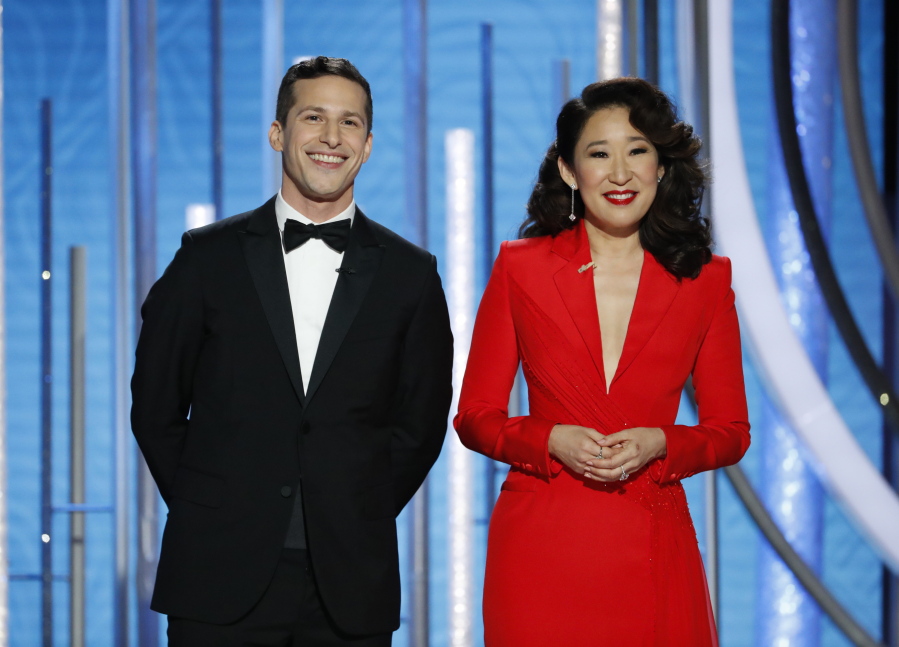It was a mix of business as usual and overwhelming sea change at the 76th Golden Globe Awards on Sunday, where the film and television industry gathered to celebrate themselves — and be seen by one another at the crowded Beverly Hilton bar during commercial breaks — on live television.
The red carpet, which was more like a women’s march last year thanks to the #TimesUp movement and conversations about representation, sexism and sexual harassment, had reverted back to a non-politicized space, where Ryan Seacrest was safe once again to ask: “Gaga, who are you wearing?” “Diamonds by Tiffany!”
But once inside, it was clear why Hollywood appeared to have taken a step back from the fervent social activism of the past few years: the race and gender equality they’d fought for was evident everywhere.
Sandra Oh was the event’s first Asian host, and also the first to win lead actress in a TV drama (“Killing Eve.”) The first black Spider-man won for best animated film. Glenn Close gave a stirring speech about women finding fulfillment in roles beyond mother and wife after her surprise win for lead actress in a drama, and for a film called “The Wife,” no less.
Regina King won supporting actress for her performance in “If Beale Street Could Talk,” a drama about black life in the 1960s by groundbreaking African-American author James Baldwin. And Ben Wishaw dedicated his award for supporting actor in “A Very English Scandal” — a drama about the painfully closeted lives of homosexuals in 1960s England — to “queer hero” Norman Scott (the real-life figure he played in the show).
Oh, who co-hosted the event with Andy Samberg, summed it up best when she spoke about her decision to take the hosting gig: “I said yes to the fear of being on this stage tonight because I wanted to be here to look out into this audience and witness this moment of change,” she said during their opening monologue.
“This moment is real. Trust me. It is real. Because I see you (pointing to women and minorities in the audience), and I see you, all these faces of change. And now, so will everyone else.”
And that’s exactly what happened during the three-hour plus ceremony, where the audience was a reflection of the shifting tectonics in both television and film. The camera panned across the banquet room’s dining tables, showing the cast and/or creators of “Black Panther,” “Crazy Rich Asians,” “Roma,” “Killing Eve,” “The Handmaid’s Tale” and “Pose” — all productions focused on groups previously sidelined, or overlooked, by mainstream Hollywood and TV.
But because this is Hollywood and nothing is entirely pure, there may have been other motives for toning down from politics. This year the Golden Globes arrived in time to influence Oscar voters. Promoting one’s show, or performance, is another form of political theater but it requires less fist pounding and more smiling.
The changes taking place across both media, however, did lay the foundation for some sharp, self-aware humor.
When Patricia Clarkson won for her performance in the limited series “Sharp Objects,” she addressed and thanked the show’s director while accepting the award. “You demanded everything of me except sex, which is exactly how it should be in our industry.”
Emotional moments abounded as well. Close, a surprise winner in her category over Lady Gaga for “A Star Is Born,” pointed out she’s been a working actor for 45 years before recalling how her mother spent her life “sublimated” to her father. The actress teared up when she said her mother, when in her 80s, told Close she felt she’d wasted her life.
“And it was so not right,” she told the crowd. “I feel like what I’ve learned from this whole experience is, women, we’re nurturers, that’s what’s expected of us. We have our children, we have our husbands if we’re lucky enough, and our partners. But we have to find personal fulfillment. We have to follow our dreams. We have to say, ‘I can do that, and I should be allowed to do that.’ ”
And it was, of all people, Carol Burnett who perhaps best exemplified that reality when she accepted the first Carol Burnett Lifetime Achievement Award. The show of genuine respect in the room, from everyone from millennial actor Darren Criss (who won actor in a limited series for his performance in “The Assassination of Gianni Versace: American Crime Story”) to legend Dick Van Dyke, was moving.
Her speech was gracious, but it was her breakthroughs in comedy and TV, and her influence on the lives of so many women and men in the room, that drove the point home. This was a night for powerful women and pathfinders such as Burnett and Close.



